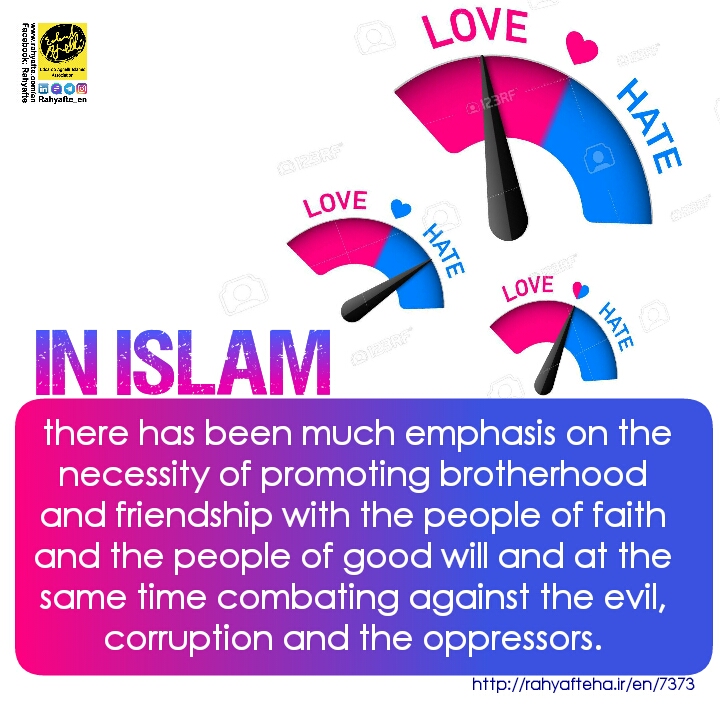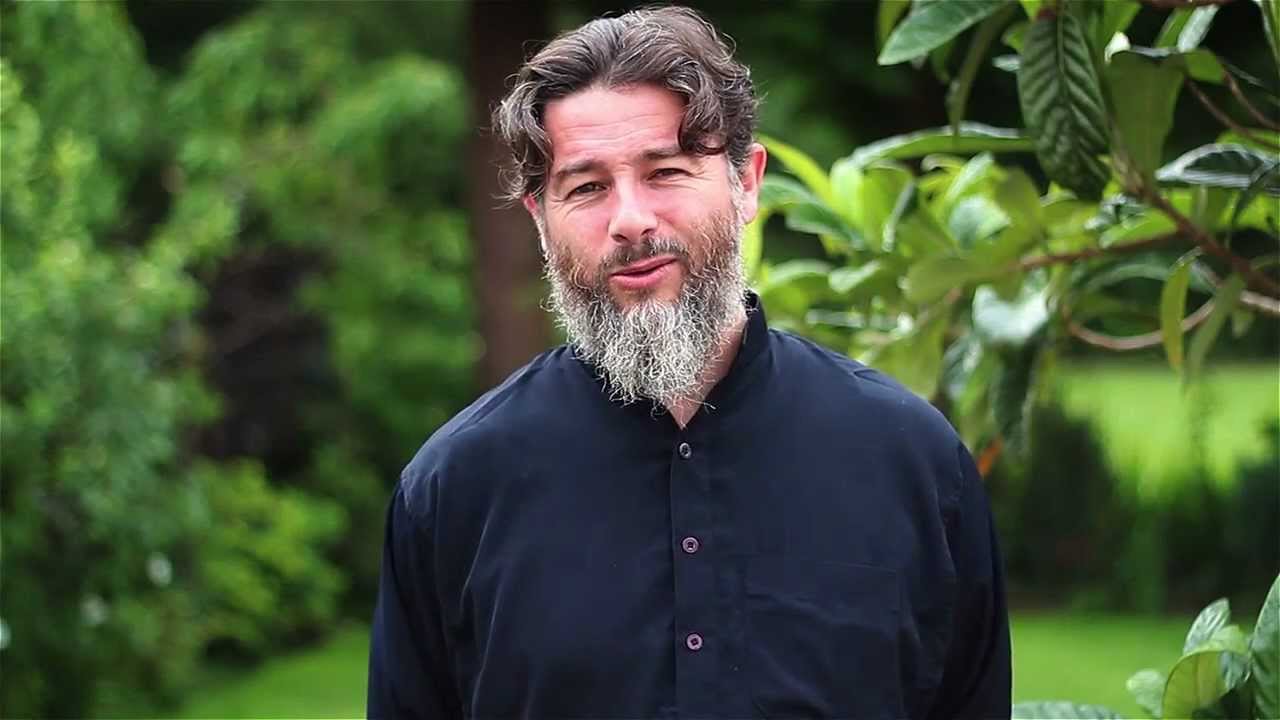According to rahyafte (the missionaries and converts website):
by: Mahnaz Heydarpoor
Love and hate
An overall study of the Qur’an and narrations (hadiths) shows that in the Islamic view love either in its Divine form or in Human form, belongs only to the precious and valuable things as far as they are so. The result is firstly that the degrees of the love that different things deserve or receive differ according to their merits, and secondly that anything which is in conflict with those precious and valuable things or prevents their realisation should be hated. For example, if justice is to be loved injustice should be hated. Or if a person who tells the truth is to be loved a person who lies should be hated. Of course, in respect to their other characters and deeds, the situation might be different. A single person might be loved or praised for something and at the same time he might be hated or blamed for the other.
In comparison with some other faiths, one aspect of love in Islam is that it is usually considered along with `hate (of the evil) for the sake of God’. One has to love for the sake of God and hate for the sake of God. There is a tendency among some people to think that there should be no hate at all. These people assume that excellence and nobility of character and “being sociable” consist of having all men one’s friends. Certainly Islam recommends Muslims to love people and optimise compassionate and sincere relationship with them, even if they do not believe in Islam or in God. However, it is not feasible for a person who has principles in his life and has devoted his life to realise sacred values to be indifferent to evil and oppressive deeds of wrongdoers and make friendship with everybody. Such a person certainly will have some enemies, whether we wish or not. There are always good people in the society and bad people. There are fair people and despotic people. Good and bad are two opposite poles. Attraction towards the good is not possible without repulsion from the bad.
When two human beings attract each other and their hearts wish for them to be friends and companions one with the other we should look for a reason for that. The reason is nothing other than similarity and resemblance. Unless there is a similarity between these two persons, they cannot attract one another and move towards friendship with each other. Rumi in his Mathnavi mentions two fine stories that illustrate this fact. One story is that once a very wise and well‑known Greek physician asked his disciples for some medicine for himself. His disciples were shocked. They said: “O, Master! This medicine is for the treatment of madness, but you are the wisest person that we know.” The master replied: ” On my way to here, I met a mad person. When he saw me he stopped and smiled. Now, I am afraid that he must have found some similarity between me and himself; otherwise he would not have enjoyed looking at me.” The other story relates to another wise man that saw a raven who had formed an affection for a stork. They perched together and flew together! The wise man could not understand how two birds of two different species that had no similarity either in shape or in colour with each other could be friends. He went close and discovered that both of them had only one leg.
That wise man said: “I saw companionship
Between a raven and a stock
Amazed 1 was, and examined their condition
To see what sign of commonality 1 could find.
So up I crept, and, to and behold!
I saw that both of them were lame. ”
In Islam, there has been much emphasis on the necessity of promoting brotherhood and friendship with the people of faith and the people of good will and at the same time combating against the evil, corruption and the oppressors. Of course, in Islam love is universal and the Prophet of Islam was not sent, “save as a mercy unto all beings” (The Qur’an 21: 107). Therefore, even fighting against those who do wrongs and injustice should be out of love. It is an act of genuine love for mankind as a whole and even, say, for a murderer such as Hitler to fight against him, to punish him and, if needed, to destroy him. Otherwise, he would do more crimes and would degrade himself more and more and would suffer much more sever punishments in this world and hereafter. There is a beautiful story that once an oppressing ruler asked a pious person to pray for him. In response, that pious person asked God not to let him live anymore. That oppressor was shocked and said: ” I asked you to pray for me and not against me!” He replied: ” This is exactly what I did. It is much better for you and, of course, for the people as well that your life becomes shorter. You will then have less chance to add to your crimes and people will have more chance to rest.”

A rational and intelligent love is the one that involves the good and interest of the mankind and not a limited number of people. One can do many things to bring good to individuals or groups which bring evil to society or mankind as a whole. For example, if a judge releases a guilty criminal he might have done something good to that person, but a great harm has been inflicted upon the society and the ideal of justice. One should not let his affections hide the truth. If our beloved child needs injection or operation we should not let our love and passions for him to prevent us from doing so.
According to Islam, love has to be enlightened. A sacred love is the love which is realistic and insightful. It has been a common theme in moral advises by great Muslim preachers and Sufi masters that one should not let one’s love for something or some person make him negligent of the whole truth. The reason for this emphasize is that love naturally tends to make the lover “blind and deaf’. If you love some one it is very unlikely to have an impartial view of it, unless the love is directed by the reason. This is why even Sufi Muslims try not to be overwhelmed by love. Siraj ed‑Din writes:
The Sufi has no choice but to be vigilant, observant, and discerning, to put everything in its rightful place, and to give everything its due. It is in virtue of this perspective that Sufism is a way of knowledge rather than a way of love. As such it tends to repudiate partialities which the perspective of love necessarily condones and even encourages. [9]
According to Islam, the minimum expectation from believers is that God should have the first place in their heart, in the sense that no other love may override one’s love for God; God should be the highest and foremost object of love. The Qur’an says:
Say: If your father or your sons or your brethren or your wives or your kinsfolk or the property you have acquired or the commerce you fear may slacken or the dwellings which you love if these are dearer to you than God and His Apostle and striving in His way, then wait till God brings about His command; God does not guide the transgressing people. (9:24)
This verse clearly indicates that one’s love for God has to be superior to one’s love for whatever else that one may come to love in one’s life. This superiority shows itself when the love for God and for His religion comes in conflict with one’s love for one’s personal belongings. In this case, a believer should be able to sacrifice his personal favourite things for the sake of God. For example, if God asks us to give our lives to protect innocent lives or our territorial integrity or the like, we should not let our love for the easy life or being with the family and so on prevent us from striving in His way.
Therefore, a believer is not the person who just loves God. A believer is the person whose love for God is the highest and strongest love he has. Elsewhere, the Qur’an says:
Yet there are some people who adopt rivals instead of God, whom they love just as they (should) love God. Those who believe are firmer in their love of God … (2:165)
Why should one love God? According to Islam, one reason for loving God lies in the fact that God is the most precious, the most perfect and the most beautiful being, that a man can ever conceive and therefore, man out of his nature that aspires to values, beauty and perfection loves God.
Many Islamic scholars, especially mystics have asserted that everybody feels in his heart a great love for God the Almighty without necessarily being aware of it. They argue that even unbelievers who are just after secular aims or ideals love and worship what they take to be the ultimate good. For example, those who want to possess power want to have the ultimate power. They will never be satisfied by becoming a mayor or even president. Even if they could control the whole globe they would think about controlling other planets. Nothing in the world can set their hearts at rest. As soon as people reach what they had set up as their ideals, they realise that it is not sufficient and they will seek for more. Islamic mystics, such as Ibn Arabi inspired by the Qur’an believe that the reason behind this phenomenon is that everybody in fact is seeking towards the ultimate good, that is, God. The Qur’an says: “O man! Surely you strive (to attain) to your Lord, a hard striving until you meet Him.” (84:6). However, the fact is that many people make a mistake in recognising what is the highest good. Some might take money as the highest good or, in other words, as their god.
Others might take political power as their god, and so on. The Qur’an says: “Have you seen him who takes his low desires for his god?” (25:43; 45:23)
If it happens that they reach what they have set up as their ideal their innate love for God, the highest good will remain unresponsive and so they will feel unhappy and frustrated. Ibn Arabi says:
“Nothing other than God has been ever loved. It is God who has manifested Himself in whatever is beloved for the eyes of those who love. There is no being except that it loves. Thus, the whole universe loves and is loved and all these go back to Him just as nothing has ever been worshipped other than Him, since whatever a servant (of God) has ever worshipped has been because of wrong imagination of deity in it; otherwise it would have never been worshipped. God, the most High, says (in the Qur’an): `and your Lord has commanded not to worship but Him.'(17:23) This is the case with love as well. No one has ever loved anything other than his Creator. However, He, the most High has hidden Himself from them under the love for Zaynab, Su’ad, Hind. Layla, dunya (this world), money, social position and all other beloved subjects in the universe. [10]
Ibn Arabi adds that: “mystics have never heard any poem or praise or the like but about Him (and they saw Him) beyond veils.” [11]
The other reason for loving God is to reciprocate His love and blessings. There is a rich literature in Islamic sources on different aspects and manifestations of God’s love and favour for all human beings, including, in a sense, wrongdoers arid those who disbelieve in Him. Human beings love whoever does good to them, and they appreciate such favour and benevolence and feel obliged to be thankful. The Prophet said:
Love God because He has done good to you and He has bestowed favours upon you. [12]
According to Islamic narrations, God said to both Moses and David: “Love me and endear Me to my people.” [13]. Then in response to their question how to endear Him to the people, God said: “Remind them about My favours and bounties, for they do not recall My favours without the feeling of gratitude.” [14]
In a mystic prayer, known as the Whispered of the Thankful, Imam Sajjad says:
My God, The uninterrupted flow of Thy graciousness has distracted me from thanking Thee!
The flood of Thy bounty has rendered me incapable of counting Thy praises!
The succession of Thy kind acts has diverted me from mentioning Thee in laudation!
The continuous rush of Thy benefits has thwarted me from spreading the news of Thy gentle favours!
Then he adds:
My God, My thanksgiving is small before Thy great boons and my praise and news spreading shrink beside Thy generosity toward me!
Thy favours have wrapped me in the robes of the lights of faith, and the gentlenesses of Thy goodness have let down over me delicate curtains of might!
Thy kindnesses have collared me with collars not to be moved and adorned me with neck‑rings not to be broken!
Thy boons are abundant‑my tongue is too weak to count them!
Thy favours are many my understanding falls short of grasping them, not to speak of exhausting them!
So how can I achieve thanksgiving? [15]
A believer who has started his spiritual journey towards God first comes to recognise God’s blessings upon him in providing him with lots of supports and helps that enabled him to act. Having continued his journey and been equipped with a mystical view of the world, he will realise that every good thing, indeed, comes from God himself. We read in the Qur’an: “Whatever benefit comes to you (O man), it is from God, and whatever misfortune befalls you, it is from yourself” (4:79) There is no reason to think otherwise. The reason for inflicting unjust suffering can be one of these things or a combination of them:
· Lack of power: A person who oppresses others may do so because he wants to gain something from it, or because he cannot prevent himself from doing something harmful to others.
· Lack of knowledge: A person may even have good intention of benevolence, but due to lack of information or making wrong conclusions may do something that harms the recipient.
· Hatred and malevolence: A person may be able to do good deeds and may also know how to do it, but he still fails to do so, because he is not kind enough to do so, or even more, because he hates the recipient and want to satisfy his anger and wrath by inflicting pain on the recipient.
Muslim thinkers argue that God never does something unjust or harmful to His servants, since there is none of the above reasons for being otherwise: He is the all‑Powerful, the all‑Knowing and the all‑Merciful.
Thus, the picture of God in Islam is the picture of one who is love, the all‑Merciful, the all-Compassionate and the all‑Benevolent, one who loves His creatures more than they may ever love Him or themselves, one whose anger and wrath is out of love and preceded by love. There seems to be no difference among Muslims in believing in God who is love, though they might vary in amount of emphasise that they put on this aspect of Islamic worldview compared to others. In general, it might be said that Muslim mystics and Sufis are more concerned with this aspect of Islam than Muslim Philosophers, and Muslim philosophers in turn are more concerned than theologians. But as I mentioned earlier there is no disagreement on viewing God as who is love, the all‑Merciful and the all‑Compassionate. We read in the Qur’an that in response to Moses’ request for the good life in this world and hereafter, God said: “(As for) My chastisement, I will afflict with it whom I please, and My mercy encompass all things.” (7:56) We find in the Qur’an that a group of angels who bear the Divine Throne pray: “Our Lord! Thou embracest all things in mercy and knowledge, therefore forgive those who repent and follow Thy way and save them from the punishment of Hell.” (40:7)
Although God’s love for His servants is not arbitrary and depends on their merits, His love for wrongdoers and who have turned their back to Him is so great that it highly surpasses their expectation. The emphasis on this aspect of Divine love constitutes a considerable part of Islamic literature, including Quranic verses, ahadith and even poems. For example, we read in the Qur’an:
Say: O my servants! Who have acted extravagantly against themselves, do not despair of the mercy of God; Surely God forgives the faults altogether; surely He is the Forgiving, the Merciful. (39:53)
The idea of repentance is one of the key concepts in this regard. In many verses of the Qur’an, God speaks of the constant possibility of repenting and returning to Him, He is the Forgiving. He says:
But whoever repents after his iniquity and reforms (himself), then surely God will return to him (mercifully); surely God is Forgiving, Merciful. (5:39).
The Qur’an also refers to the fact that God not only forgives those who seek forgiveness, but also He may change their wrong deeds to good deeds. On those who repent and believe and do good deeds, the Qur’an says:”… these are they of whom God changes the evil deeds to good ones; and God is Forgiving, Merciful.” (25:70).
It is interesting that in the Qur’an, God is introduced not as the one who just accepts the repentance of his servants and returns to them when they return to him. Indeed, it is God Himself that first attends to His servants who have broken in a way or another their servitude relationship with God, but still have love for goodness and truths in their hearts (i.e. their hearts are not sealed). God returns to such servants and then they repent and return to Him, and then God returns to them to forgive them. Therefore, as S.H. Tabatabai, the author of Al‑Mizan in 20 volumes, notifies, every repentance and return of a wrongdoer servant is surrounded by two returns of God: the first return that gives that person the ability for voluntary repentance and the second return which is His forgiveness after the person has repented. The fact is clearly suggested by the Qur’an:
… they knew it for certain that there was no refuge from God but in Him; then He turned to them (mercifully) that they might turn (to Him); Surely God is the oft‑returning (to mercy), the Merciful. (9:118)
According to Islamic mysticism, one’s knowledge of God as the most beautiful and perfect being and the source of all good things that one has and successively one’s love for God who is love and mercy gets so strong and encompassing that it will occupy all one’s heart. At the same time, knowledge of one’s weakness and deficiencies in front of God gets so intensive and deep that finally he will feel emptiness and nothingness. As such a person loses his sense becomes selfless, he will be identifiable with every type of goodness. From nothingness, one reaches the position of everythingness. He will feel no limitation or restriction. In a well‑known hadith, we read that
Servitude to God is a substance, whose essence is lordship. [16]
A pure servant of God whose will is melt into His will be able to bring about extraordinary deeds.
Sheikh Mahmud Shabistari in his Sa’adat Nameh has a beautiful description of what he takes to be different stages of the spiritual journey towards God. He says:
The service and worship of God
Is a dictate of the Merciful
To every creature: man and jinn alike.
And yet this order takes to task
The most elect‑as God has said:
“I did not create the jinn and men for aught
but they should worship Me.” (the Qur’an, 51:56)
Through worship man is brought to prayer;
From prayer to mystic thought, and then from though
The flame of gnosis leaps, until he sees
The truth with contemplation’s inner eye.
Such wisdom comes from altruistic love (or kindness):
The latter is its fruit, the first the bough.
At last comes Love which ousts all else:
Love undoes all sense of `two’;
Love makes all One,
Until no `mine’
Nor `thine’
Remain. [17]
Suhrawardi in his On the Reality of Love elaborates his view on the spiritual journey. He believes that this journey and its states and stations arise from virtue (husn), love (miter) and reflective sadness (huzn). He relates virtue to the knowledge of God and love to the knowledge of self. Sadness is the outcome of the knowledge of what was not and then was. Suhrawardi believes that knowledge of the self leads to the discovery that the self is divine and this results in loving God and having Sufi experiences. It is indeed a Qur’anic idea which is clearly and greatly emphasised by ahadith that there is a necessary relation between knowing one’s self and knowing one’s Lord. For example, the Prophet Muhammad said: “Whoever knows himself has known his Lord.” [18] Suhrawardi believes that sadness is caused by reflection on the created order which signifies separation of man and his departure from his original abode. [19]
According to Islam, love for God is very active and manifests itself in all aspects of one’s life. It shapes all one’s love and hatred. It also shapes one’s behaviour with others and with one’s self. In the well‑known hadith of nawafil (meaning noncompulsory good deeds) we read:
Nothing makes My servants closer to Me compared to the performance of obligatory deeds, wajibat. My servant constantly gets close to me by nawafil till I love him. When I love him, then I shall be his ears with which he listens, his eyes with which he sees, his tongue with which he speaks, and his hands with which he holds: if he calls Me, I shall answer him, and if he asks Me, I shall give him. [20]
A sincere lover has no power to disobey the beloved person or to refuse his wishes. Imam Jafar al‑Sadiq said: “Do you disobey God and pretend you love Him? This is amazing. If you were true you would have obeyed Him, for the lover is submissive before the one whom he loves”. [21] We read in the Qur’an:
O you who believe! Whoever from among you turns back from his religion, then God will bring a people, He shall love them and they shall love Him, lowly before the believers, mighty against the unbelievers, they shall strive hard in God’s way and shall not fear the censure of any censurer. (5:54)
The history of Islam is full of memories of those who embodied a sincere and overwhelming love for God and His religion. One of those who full‑heatedly devoted himself to Islam was Bilal al Habashi, a black slave. The pagans of Quraysh in Mecca subjected him to torture asking him to mention names of their idols express his belief in them and disbelieve in Islam. They tormented him under the burning sun by laying him on scorching stones and putting heavy rocks on his chest. Abu Bakr, a rich companion of the Prophet, was passing by when he heard the cry of Bilal. He went close and advised him to hide his belief, but Bilal was not prepared to do so; since “love was ever rebellious and deadly”. Illustrating the event, Rumi says:
Bilal was devoting his body to the thorns
His master was flogging him by way of correction,
(Saying:) “Why dost thou celebrate Ahmad (the other name of the Prophet)?
Wicked slave, thou disbelievest in my religion! ”
He was beating him in the sun with thorns
(While) he cried vauntingly “One!”
Till when Siddiq (Abu Bakr) was passing in that neighbourhood,
Those cries of “One!” reached his ears.
Afterwards he saw him in private and admonished him:
Keep thy belief hidden.
He (God) knows (all) secrets: conceal thy desire. ”
He (Bilal) said: “I repent before thee, O prince. ”
There was much repenting of this sort,
(Till) at last he became quit of repenting,
And proclaimed and yielded up his body to tribulation,
Crying: “O Muhammad! O enemy of vows and repentance! D thou with whom my body and all my veins are filled!
How should there be room therein for repentance?
Henceforth I will banish repentance from this heart.
How should 1 repent of the life everlasting?”
Love is the All‑subduer, and I am subdued by Love:
By Love’s blindness I have been made bright like the sun.
O fierce wind, before Thee I am a straw:
How can I know where I shall fall?
Whether I am Bilad or the new moon,
1 am running on and following the course of Thy sun.
What has the moon to do with stoutness or thinness?
She runs at the heels of the sun, like a shadow.
The lovers have fallen into a fierce‑torrent:
They have set their hearts on the ordinance of Love.
(They are) like the millstone turning round and round
Day and night and moaning incessantly. [22]
A believer who loves God is expected to love His people and be kind to them. Of course, those whose evil character surpasses this factor are excluded. The Prophet said:
O servant of God, let your love and hate be for the sake of God, because no one can attain to the wilayah (guardianship) of God without that, and no one shall find the taste of faith without that, though his prayers and fast be great in number. [23]
If one’s love and hate are to be only for the sake of, it would be impossible not to love His people.
On the necessity of love for people, we see that the Qur’an praises those members of the Household of the Prophet who fasted three days and gave everyday the only little food that they had at home successively to a poor, an orphan, and a captive: “And they give food out of love for Him to the poor and the orphan and the captive. [They tell them:]we only feed you for God’s sake: we desire from you neither reward nor thanks.”(76:8 & 9)
There is a well‑known hadith narrated in different sources that the Prophet said: “People are all God’s family, so the dearest people to Him are those who benefit His family the most.” [24]
According to a hadith and similar to what is mentioned in the New Testament (Matt. 25:31‑46), on the Day of Judgement God will ask some people why they would not have visited Him when He was sick, why they would not have fed Him when He was hungry and why they would not have given water to Him when He was thirsty. Those people will ask: How could these have happened, while you are the Lord of all the world? Then God will. reply: So and so was sick and you did not visit him, so and so was hungry and you did not feed him and so and so was thirsty and you did not give water to him. Did not you know that if you did so you would find Me with him? [25]
Thus, in Islam love plays an essential role in ethics, mysticism, theology and even philosophy. To draw an Islamic picture of the world, including the story of the creation of the universe and mankind and then god’s treatment of humanity one always needs to invoke the notion of love. God Himself is love and has created the world out of love. He treats human beings with love. Faith also starts with love, an overwhelming love for certain truths and is required to flourish by the nourishment of this love to the extent that one’s love for God fills all parts of one’s heart and directs all aspects of one’s life. One’s love for God can increase only when one reduces one’s selfishness and if one can ultimately get rid of selfishness and I‑ness one will be a perfect man whose will and pleasure would be the will and pleasure of God. Love for God and freedom from selfishness can be secured at first by sacrifice and losing one’s desires for the sake of God, and His people and then by having no desire other than what He desires and no will other than His. Then, of course, there will be no sacrifice and no pain. Ethical rules are guidelines of this path of love, enlightened and oriented by teachings of the intellect and prophets.
Notes:
[9] Siraj ed‑Din, 1989, p. 234
[10] Ibn Arabi, 1994, Vol. 2., p.326
[11] Ibid.
[12] al-Daylami, 1370 A.H., p.226; my translation
[13] al‑Majlisi, 1983, Vo1.8, p.351 & Vol. 14, p. 38; my translation
[14] Ibid.
[15] Chittick, 1987, pp. 242 & 243
[16] Mizan al Hikmah, Vol. 6, p. 13, no. 11317
[17] Cited from Beyond Faith & Infidelity: The Sufi Poetry and Teachings of Mahmud Shabistari by L. Lewisohn, 1995, pp.231& 232.
[18] For a discussion on self‑knowledge (ma’rifat al‑nafs), See Shomali, 1996.
[19] For a discussion on his view in this regard see Suhrawardi and the School of Illumination by Mehdi Amin Razavi, 1997, especially p.680.
[20] al Kulayni, 1397 A.H., Vol. 4.`p. 54; Arabic
[21] Cited from Mutahhari, 1985, Ch. 6.
[22] Mathnawi, Book 1, translated by Nicholson.
[23] (Majlisi, 1983, Vol. 27, p. 54)
[24] Hemyari, 1417 A.H., p.56
[25] For example, see al‑Hilli, 1982, p. 374.
Source: https://www.imamreza.net
Perspectives on the Concept of Love in Islam (1)
DUA: Allah! please accept this from us. You are All-Hearing and All-Knowing. You are The Most Forgiving. You are The Most Relenting and repeatedly Merciful. Allah! grant us The Taufiq to read all the 5 prayers with sincerity.
(Taken from To Be Earnest In Prayers By Amina Elahi)
■ Feel Free to Share the posts with your Friends…
■ You too can take part and help us in sharing the knowledge…
■ May Allah SWT reward you for conveying His Message To Mankind




















